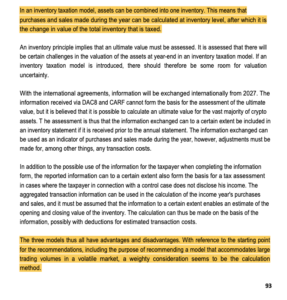Highlights:
- Denmark plans to impose a 42% tax on unrealized crypto gains.
- The tax Minister supports simpler regulations to reduce unfair taxation.
- The Tax Council’s recommendations will be discussed early next year before Parliament.
Denmark plans to introduce a groundbreaking 42% tax on unrealized crypto gains starting January 1, 2026. On Wednesday, the Danish Tax Law Council proposed that this tax apply to future acquisitions and crypto purchases as far back as Bitcoin’s inception in January 2009.
Denmark Explores Three Tax Models for Crypto, Favoring Annual Inventory Taxation
In a 93-page report, the Council presented three possible models for taxing crypto: capital gains tax, warehouse taxation, and inventory taxation. The preferred “inventory taxation” model would classify an investor’s entire crypto portfolio as a single “inventory,” taxing it annually, regardless of sales. However, these are only recommendations and not yet official laws.
In the inventory model, crypto assets would be taxed like other financial assets, including stocks and bonds. In summary, Danish crypto owners may face taxes on both unrealized gains and losses. The recommendations did not specify how far back these new tax rules would apply to existing holdings.
BREAKING: 🇩🇰 Denmark considers taxing unrealised gains on #Bitcoin and crypto with a bill to be tabled in January.
— Bitcoin Archive (@BTC_Archive) October 23, 2024
Danish Tax Minister Rasmus Stoklund noted that many investors face unfair taxation under the current system. He suggested that new regulations should simplify the taxation process for crypto assets.

Denmark to Perpose Crypto Tax and Reporting Regulations in Early Next Year
The Council proposed that crypto service providers report customer transaction data, accessible to all EU nations. The Tax Minister noted the bill will be presented to the Danish Parliament in early next year. If approved, it could take effect on January 1, 2026, pending Parliament’s evaluation and approval.
Stoklund emphasized the need for clearer and more suitable rules in this area. He looks forward to discussing the bill with the Folketing parties. Denmark’s Tax Council’s recommendations reflect global efforts to strengthen tax regulations for both crypto and traditional financial assets.
Stoklund stated:
“Throughout recent years, there have been examples of Danes who have invested in crypto-assets being heavily taxed. That is why I am pleased that the Tax Council has today submitted some elaborate and up-to-date recommendations. The council’s recommendations can be a way to ensure more reasonable taxation of crypto investors’ gains and losses.”
The Danish government announced that it will begin sharing data on crypto investors internationally starting in 2027. This aims to regulate around 300,000 Danes who own crypto assets and reduce potential tax evasion.
Global Moves to Regulate Crypto Taxation
Denmark’s Tax Council’s recommendations align with global efforts to tighten tax regulations on crypto and traditional assets. On September 5, Democrat presidential candidate Kamala Harris proposed a 28% tax on long-term capital gains. This would apply to assets owned for more than one year for households earning over $1 million annually.
Italy recently announced plans to increase its capital gains tax on Bitcoin and other cryptocurrencies to 42%. This change aims to give more resources to families, youth, and businesses, increasing from the current 26% rate set last year.
JUST IN: 🇮🇹 Italy to raise capital gain tax on #Bitcoin from 26% to 42%.
— Watcher.Guru (@WatcherGuru) October 16, 2024





